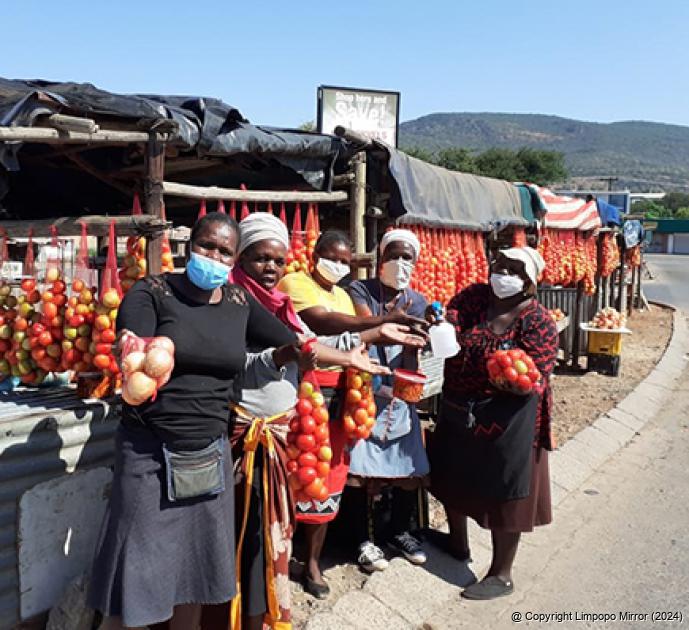

ADVERTISEMENT:

Photographed at the Nzhelele-Biaba stalls are, from left to right, Mashudu Tshivhenga, Nyambeni Shotheli, Tshililo Netshidzivhe, Gladys Khunwana, and Mashudu Mathalise.
Nzhelele fruit-and-vegetable sellers back at work
The fruit-and-vegetable stall owners at Nzhelele-Biaba are back at work, following the inclusion of informal businesses in the Department of Trade and Industry’s list of essential businesses during the national lockdown.
Several of the hawkers shared their experiences with Limpopo Mirror. They all share similar bad effects of the lockdown, where they were initially ordered to shut their businesses, losing thousands of rands as the stock had to rot.
Vho-Mashudu Tshivhenga, who started operating a fruit-and-vegetable stall at Biaba in 2006, said that she had lost stock in excess of R2 000. “Zwo tou sina (it all got rotten), because I could not sell it to people during the lockdown,” she said. “The lockdown announcement was too short for us to do away with the available stock. I moved my stock from the stall to home, and I had to watch my tomatoes, onions and other wares rotting right at home.”
Vho-Nyambeni Shotheli, from Tshirolwe, said that she was glad that she was back at work and that she could now manage to earn a living for her children. “But honestly speaking, I am not making as much money as I used to do during the open days,” she said. “I am still raising some money to pay the lady from whom we get our stock. We normally take stock on credit and pay later.”
Vho-Mashudu Mathalise from Ha-Rabali is the sole breadwinner in a family of four children and three grandchildren. “I am the ‘man’ of the house,” she said, “which means that I am the sole provider in the family. If I do not work, they do not eat. But then, business is hard now.”
Vho-Gladys Khunwana from Tshituni-Gavhe said that when the government got to provide relief funds to fruit-and-vegetable stall owners, they should communicate directly with them and not send messengers who would then abuse them.
“Our government is considerate in many terms, and the problem is the kind of people whom the government sends to us,” she said. “Many good projects that are meant to empower the poor entrepreneurs in rural areas end up not working well because of corrupt in-between persons.”
Another hawker, Vho-Tshililo Netshidzivhe, the mother of four children, said that she had accepted the loss that came with the initial closure of informal businesses, but then she was faced with a situation where she was hardly making a profit. “I have come to realise that while I am not making much profit, I am better off than staying at home with no source of income at all,” she said.
Vho-Takalani Mukwevho is the strong and resilient farmer who delivers tomatoes to the fruit-and-vegetable stall owners. “I am faced with a bigger challenge at this stage,” she said. “While I had managed to have good and juicy tomatoes this time around on our farm, we are not making any instant or regular profit in that we are giving most of our produce on credit. We fully understand that hawkers are faced with hard times where they cannot afford to pay cash for stock.”
The struggle of the hawkers to make end meets in the Vhembe District continues.
Date:03 May 2020
By: Tshifhiwa Mukwevho
Tshifhiwa Given Mukwevho was born in 1984 in Madombidzha village, not far from Louis Trichardt in the Limpopo Province. After submitting articles for roughly a year for Limpopo Mirror's youth supplement, Makoya, he started writing for the main newspaper. He is a prolific writer who published his first book, titled A Traumatic Revenge in 2011. It focusses on life on the street and how to survive amidst poverty. His second book titled The Violent Gestures of Life was published in 2014.
Read: 2998

ADVERTISEMENT

ADVERTISEMENT:

ADVERTISEMENT:

Recent Articles
-

Stiff penalties get issued to undisciplined SAFA Vhembe teams
18 April 2024 By Kaizer Nengovhela -

Battle of the Stars awaits in Sasol Women’s League
18 April 2024 By Frank Mavhungu -

Community threatens with shutdown if roads are not fixed
18 April 2024 By Elmon Tshikhudo -

Young Ravhuhali steers the ship successfully at Vhembe FM
18 April 2024 By Elmon Tshikhudo -

A new traditional leader gets installed at Phiphidi
18 April 2024 By Kaizer Nengovhela

ADVERTISEMENT

Popular Articles
-

Leopards’ top striker dreams of playing for Kaizer Chiefs
22 March 2024 By Frank Mavhungu -

Well-known inventor, Prof Mulalo Doyoyo, dies
14 March 2024 By Victor Mukwevho -

Lesley Manyathela stadium remains a 'white elephant' to local clubs
23 March 2024 By Kaizer Nengovhela -

Murder suspect appears in Mutale Court
22 February 2024 By Victor Mukwevho -

Masindi case likely to introduce new era of customary law
24 February 2024 By Anton van Zyl -

Park development leaves residents puzzled
22 March 2024 By Andries van Zyl -

Many questions as man shoot himself in the head
15 March 2024 By Elmon Tshikhudo

